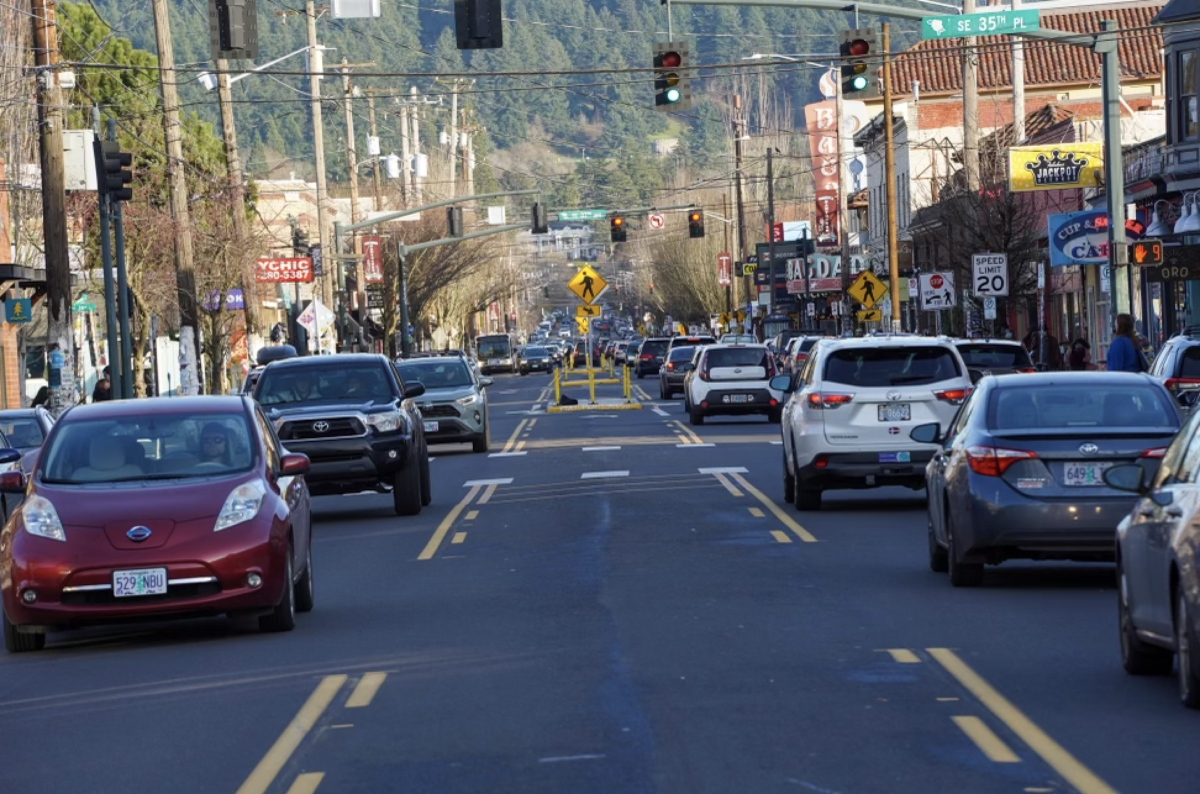
“We feel change is too slow coming when the need is so great.”
– BikeLoud PDX
Portland nonprofit BikeLoud PDX plans to sue the Portland Bureau of Transportation for not building legally required cycling facilities when they did major road projects — a requirement outlined in ORS 365.514, a law known as the Oregon Bike Bill.
The bill was last tested in 1995 when the Bicycle Transportation Alliance (now The Street Trust) won a lawsuit against the City of Portland and forced PBOT to include bike lanes through the Rose Quarter.
Nearly 30 years later, another group of Portland advocates want the Bike Bill to have its day in court once again. BikeLoud PDX announced their plans at a meeting Wednesday night. Scott Kocher, a lawyer with Forum Law Group who has won transportation-related lawsuits against PBOT in the past, will represent the nonprofit. (Disclaimer: Kocher is a financial supporter of BikePortland.)
“The suit seeks implementation of key improvements identified in the City’s Bicycle Plan where those improvements better serve current needs,” a BikeLoud press release states. “Portland roads need safe facilities to reach our climate, community, equity, and safety goals for all road users.”
According to BikeLoud, there are “numerous locations where the city has failed since 1971 to provide safe and adequate places for people to ride and roll when streets were constructed, reconstructed or relocated.”
One of these locations – and a primary impetus for this lawsuit – is SE Hawthorne Blvd. Advocates wanted the city to include bike lanes in its Hawthorne ‘Pave and Paint’ project completed last year, but PBOT refused. Zach Katz, a former Portland resident and bike advocate who has since left the state, raised about $13,000 in a GoFundMe campaign to sue the city for its Hawthorne decision. That money will be used to fund BikeLoud’s suit, although they’ve decided to take on more than just Hawthorne.
The suit will include a list of over 20 projects BikeLoud feels did not comply with the law.
The bike bill requires that agencies provide walkways and bikeways on all roadway construction, reconstruction or relocation projects. If, for example, a bike lane is not feasible on a specific road project, a viable alternative must be provided. Advocates began looking more closely at the bike bill in 2020 when The Street Trust attempted to expand the bike bill through the state legislature.
“BikeLoud volunteers write letters, testify at hearings, meet with elected leaders, and take staff on policy rides because we are dedicated to serving people who are outside of cars who want to go places too,” the press release states. “We feel change is too slow coming when the need is so great.”
BikeLoud says they tried to work with the City of Portland, but when PBOT refused to cooperate with a public records request that sought information about projects that might have skirted the Bike Bill, the nonprofit felt a lawsuit was necessary.
The plaintiffs-to-be are not looking for a financial settlement. They want the city to build the bike infrastructure they believe they’ve failed to provide in the past. If it’s not possible to build bikeways on specific streets that were reconstructed, a judge could help both sides negotiate a fair settlement that would build higher-quality, nearby alternate bike routes.
This lawsuit has the potential to put BikeLoud in the spotlight in a new way, and members are ready for it. At a BikeLoud member meeting in southeast Portland Wednesday night, the excitement was palpable. It’s clear members think this could provide the energy needed to reinvigorate biking in Portland.
“There’s a general feeling this city has lost some of its vision,” BikeLoud chair Kiel Johnson said at the meeting. “Bicycling doesn’t solve all the problems, but it does make things a little bit better. I think it’s a really important thing to advocate for.”
BikeLoud will lead a ride this Friday (11/18) to file the lawsuit at the Multnomah County Courthouse.



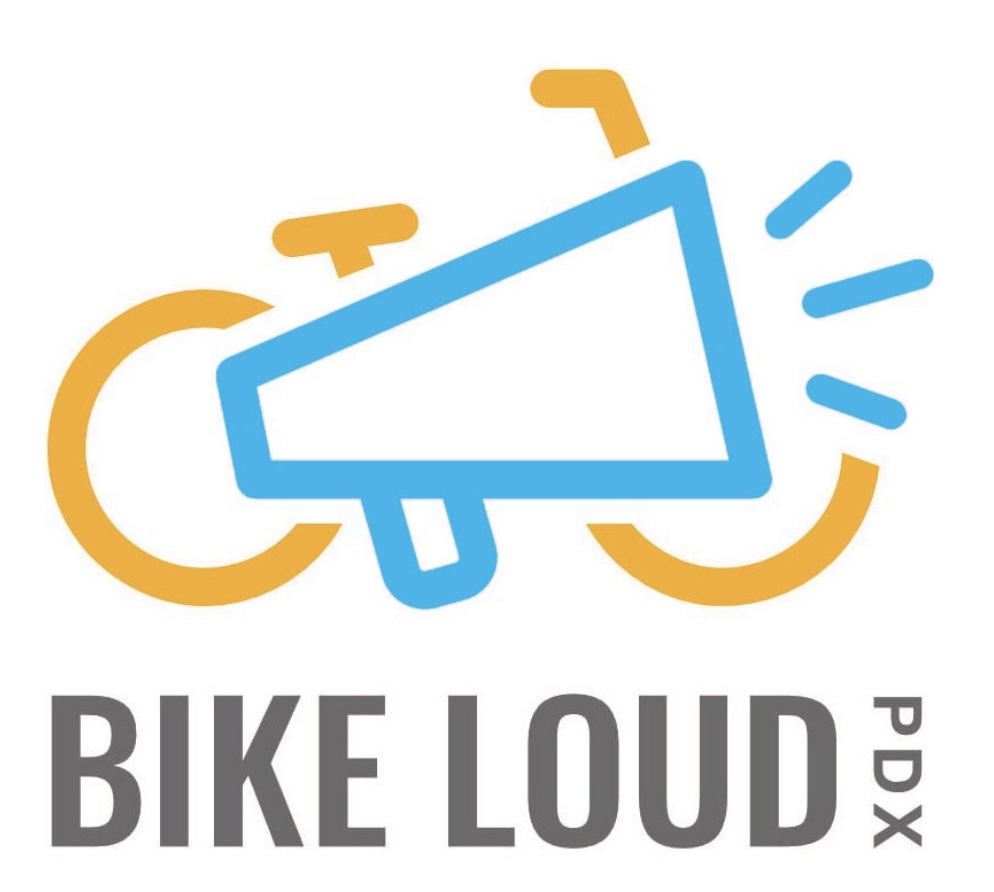
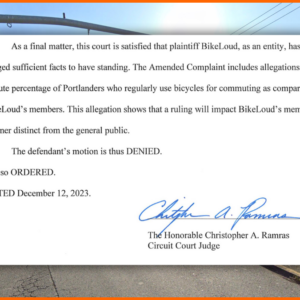

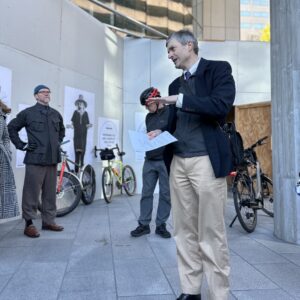
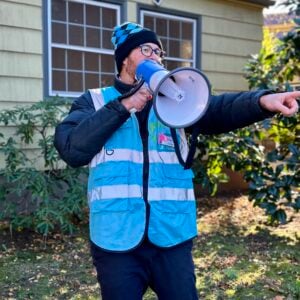
Thanks for reading.
BikePortland has served this community with independent community journalism since 2005. We rely on subscriptions from readers like you to survive. Your financial support is vital in keeping this valuable resource alive and well.
Please subscribe today to strengthen and expand our work.
Interesting AND God Speed / Good Luck!
Though I worry… this is how good groups go ‘bad’, as this is the same path that BTA trod once to success …
I attended an Active Transportation Summit a few years ago. They mentioned another lawsuit that the disabled community filed to get sidewalk ramps re-done to proper specification. The lesson I took from that is if you really want to get a transportation agency like PBOT or ODOT to do something, sometimes you have to sue them. Good job BikeLoud.
Small correction to the article: 1995 was nearly 30 years ago.
That one was successful because the ADA is a very strong civil rights law that specifies exact requirements that curb ramps are upgraded anytime a repaving project is done. It has very strong case law established. The bike bill is a pretty porous bit of Oregon law that has a lot of exceptions and is written very vaguely in a way that leaves it open to interpretation.
what you said about suing is sad but true
Yes. And even then… the fixing of the curb cuts(over how many years? 10?) that were part of that settlement have not come to fruition yet, and were delayed because of Covid. So…a win, but a very slow one.
Any evidence?
Of what, exactly? In any case, yes there is proof. Feel free to look it up.
PBOT constructs over 1,000 ramps per year per the settlement.
Will the people who accused Katz of taking the money and running away with it now give him a well-deserved apology for the slander and libel?
Great, so it turns out he is independently wealthy enough to go gallivanting off to Amsterdam as soon as he doesn’t get his way on his pet project. It’s not that much better. He was really not very transparent about the money, and only has himself to blame if people assumed he took the money. In any case, he is still wasting all their money on a frivolous lawsuit that won’t change anything.
To me this reads like a baseless personal attack.
Says you,Smee. You think suing the city for continuing to break their promises, and refusing to follow their own bill is frivolous? Hm… I see. You must be fun at parties.
It’s a state law, not ‘their promises’ or bill. And the city provided an alternative in adjacent Greenway.
Yes. Promises of a bill that became law.
I think Smee’s response answers that question. I’ve got to say it’s a good pivot to independently wealthy and it’s all his fault for not communicating enough. Also I love how he’s still the one wasting their money even though Bike Loud is bringing the lawsuit which was what they donated the money for anyway… Classic internet.
Thanks for the article Taylor at least I’ll have this to point to next time someone makes that baseless claim.
A few *might* apologize, but I doubt it.
SE Hawthorne was initially designated as a bike route in the city’s 90’s bike plan and the city has failed miserably twice now at providing bike infrastructure on this signature arterial street. I applaud and fully support this initiative!
I would kill for a protected bike lane on it honestly. Continuing the bike lane that starts from the bridge all the way down Hawthorne would do a huge huge amount for cycling in Portland, I suspect. It would make it much less painful to get from the west side neighbors to Hawthorne, and from the Hawthorne neighborhood (and nearby neighborhoods) to the westside.
Many streets need bike lanes, but I can’t think of another street where it would make as big a difference as on Hawthorne
A protected bike lane needs at least 8 feet of space (6’+2′), so you’re suggesting removal of all on-street parking in a busy (read successful) commercial corridor, pushing even more retail customers into the neighborhood to find parking.
I can’t think of a better way to ignite a revolution to replace elected leaders with ones that support small businesses over bike lanes than to remove the parking on 40 blocks of SE Hawthorne.
Finally! An organization not living off the largesse of the DOTs is willing to go beyond “activism theater” and take some potentially effective action to make our streets safer.
Maybe we can elect a leader of BikeLoud as our next mayor.
Not trying to be dense but what part of the Hawthorn project “constructed, reconstructed, or relocated” the roadway?
Is BikeLoud making the argument that a grind and pave = reconstruction?
Grind and paves have never been subject to the bike bill. BikeLoud should know better than to make that argument.
They constructed median islands, reconstructed many of the curbs, redesigned the configuration of the lanes, etc.
But none of those things are considered (re)construction of a roadway. I hope you have other examples besides Hawthorne to push the lawsuit forward because even though I wanted bike lanes to be included, it’s a pretty big stretch in this case. If you’re goal is to tie the bike bill to ADA corner upgrades, you probably need a new law, not a new lawsuit.
https://mailchi.mp/13bb950ad754/bikeloud-pdx-sues-city-of-portland
Strange that Hawthorne is highlighted in this piece but none of these other streets are listed. Show your work, bikeloud!
They put in more crossings, they built bus platforms, and they put in new signals.
Did the city use ODOT money to repave Hawthorne?
https://oregon.public.law/statutes/ors_366.514
Was the Hawthorne Pave and Paint project a major road construction, reconstruction, or relocation?
Does the Salmon NG count as an adjacent bike route?
https://www.portlandoregon.gov/transportation/article/58288
All very good points. The answers are maybe, no, and yes.
The funding source doesn’t matter AFAIK (after asking the same question to a lawyer who knows the bike bill very well).
That’s the kind of question that hasn’t been clear, which makes it easier for gov’t to shirk obligations. Also, depends on who interprets the bike bill (and why this lawsuit is necessary IMO).
Open to interpretation! And it’s the reason this suit is being filed. I say no it’s not. But if someone like PBOT wants to refuse to put bike lanes on Hawthorne, they need to then step up and make NGs like Salmon a whole hell of a lot better.
And the greenway jumps up to Taylor just past Sunnyside School. That’s 1.0 miles away from Hawthorne within an urbanized space.
Actually, about 1/5 of a mile.
https://imgur.com/olcFTew
Even the old BTA said repaving didn’t count as “construction”, if I recall. I thought this was pretty settled. I have no love for ODOT/PBOT, but I am pretty comfortable with the concept that Hawthorne repaving did not trigger the bike bill, and think “shirking” is an unfair insinuation.
The St. John’s Bridge, on the other hand… Shirk, shirk, shirk.
I should add, after reading subsequent comments, that I hope I’m proven wrong in court. I would love a more expansive reading of the bike bill, and I would love some recent legal ruling that demonstrates it’s enforceable.
I’d be very interested in hearing this lawyer’s justification for why Portland “Fix Our Streets” local gas tax revenue is part of the “State Highway Fund”.
This has been previously litigated.
I’m not sure it’s a good idea to give a judge the opportunity to interpret (weaken) this bill.
I am not a lawyer!!
But there are a lot of examples about language in the ORS that is not meant to be interpreted as it’s written and/or is often applied in a way that is different than a strict reading would have you think. Like the fact that “highway” means any road, even a tiny residential street, not just what we usually consider fast arterials.
And I too am concerned about giving a judge the power to weaken the bill. I asked Scott about that and he didn’t seem too worried about it. I’ll be sharing more soon.
A lawsuit can easily result in a weakening of the law if a judge decides to interpret it to have a lot of exemptions and defers to cities to make decisions on their own roadways. It’s a risky strategy that could end up falling one way or the other. We’ll see!
Wouldn’t be the first time BikeLoud has harmed the cycling community.
All gas taxes, including state, federal, county, and city, are collected by the state DOT (in Oregon by ODOT), then distributed to each entity – FHWA, state, county, and city using various formulas – so yes, the city technically used ODOT funding to repave the street. And in addition, ODOT gave PBOT permission to use those funds.
This was not a simple overlay, but instead the city had to repair deep potholes first before they did a deep grind, so yes, this probably qualifies for a major road reconstruction. (IMO, it’s interesting the law uses “or” rather than “and” to list the various types of work, making it more flexible.)
Parallel routes are normally within one Chicago block or 500 feet of a roadway, so if Salmon is beyond that, then it doesn’t qualify.
Thanks for the clarification.
https://oregon.public.law/statutes/ors_366.505
The State Highway Fund shall consist of:
(c) Moneys and revenues derived from any tax levied upon gasoline, distillate, liberty fuel or other volatile and inflammable liquid fuels
ODOT has the screening criteria here:
https://www.oregon.gov/odot/RPTD/RPTD%20Document%20Library/Bike-Bill-Screening-Flow-Chart.pdf
And more “interpretation” here:
https://www.oregon.gov/odot/Programs/TDD%20Documents/Interpretation-of-ORS-366.514.pdf
“Includes new roadway construction, roadway widening, realignment, and full-depth pavement work. Routine maintenance projects that do not include additional work are exempt…”
“Preservation overlays are also excluded if the only intent of the project is to preserve the riding surface in usable condition, without any widening or realignment.”
I very much doubt routine maintenance (fixing potholes) will be considered “full-depth pavement work”.
Fixing potholes is certainly pavement work. Wouldn’t whether it counts as full-depth pavement work depend on the depth of the potholes?
Salmon and Harrison are both further away from Hawthorne than 500 feet; I would put Salmon at about 900 – 1000 feet and Harrison at about 1250 feet based on google maps. Salmon is three blocks from Hawthorne and Harrison is four. When these two ‘greenways’ jump over to Taylor and Lincoln, respectively, both the distance and the number of blocks from Hawthorne increases.
I think there’s a reason no one has successfully sued over the bike bill since 1995. It’s because the way the bike bill is written, with a ton of caveats and exceptions (plus case law establishing those many exceptions), it is very hard to show that the bike bill was actually violated. The Rose Quarter was a unique case where TriMet didn’t want to allow bikes through there at all, despite reconstructing the whole area and having lots of room to allow bikes. That was a clear violation. I’m guessing there will be clear reasons why it didn’t apply or was actually followed given the exceptions and caveats for these city streets. Hawthorne is mentioned, for example, but that was a grind and inlay repaving project and the bike bill has never applied to those situations. That’s very established case law.
It will be interesting to see what happens, but I actually don’t think this will go anywhere. Lawsuits are filed all the time that don’t go anywhere. Zach’s threatened lawsuit over Hawthorne was so bad no one would take the case. You mention Scott Kocher successfully suing the city, but he’s had plenty of unsuccessful lawsuits too. Remember when he sued over vision clearance? That didn’t go anywhere. Totally dead in the water, because he was citing a state law while ignoring another state law that gives cities local authority. You can’t pick and choose what laws you think apply.
Hawthorne Paint and Pave did rebuild the majority of the corners, tearing out the concrete and pouring new, and in some (many?) cases, changed the curb line, so you could call that “reconstruct”. All of this work was acutally done to meet ADA requirements under Kinney v Yerusalem, to build ramps (to current ADA specs) when a road is rebuilt, with a standard, established in Kinney, that I believe PBOT has interpreted to include a grind and repave.
You’re right that grind and pave triggers ADA ramp upgrades. That question was settled in Hines, et al. v. City of Portland though, not the case you list above. See: https://creeclaw.org/2018/06/05/news-release-major-milestone-reached-in-making-portlands-streets-and-sidewalks-more-accessible/
Case law has already established that reconstruction for the bike bill means that the entire sub-surface is reconstructed. Grind and inlay projects don’t count as reconstruction.
Good scoop! Thanks for linking the original bike law.
Can you please publish the filing here tomorrow?
It’s only a matter of time before that single lane design is going to get a cyclist or pedestrian seriously injured or killed. People are going to bike on Hawthorne it’s where the destinations are. Some drivers are going to get impatient and attempt to make a dangerous pass. Ultimately that will result in a pedestrian crossing the road not being seen or a pass that’s too close.
Yes, agreed with much of the discussion here per case law etc. vs the Bike Bill. The US ADA has stronger supporting language + 9th Circuit Court case law too per paving triggers.
As was pointed out: its much rarer today for the city (or state) transportation / highway departments to totally blow off bike access improvements like the bad old days when installing network of Bike Route signs was 100% of a good project outcome…but we all know better of the collective benefits of great bikeways for any successful city.
Having said that – other than working with the state legislature on making the Oregon Bike Bill clearer – we are stuck in this ‘dilemma zone of good intentions’ and lack of project / policy leadership in fulfilling the oft repeated “Bike Town” type sloganeering by the city leaders/ department heads per the city’s vision outcomes…except when it does not negatively affect motor vehicle travel times / volumes / parking convenience along commercial corridors.
What would be nice is this suit getting some squishiness out of the law; several streets have been rebuilt due to landslides across the city, and in most cases no ped or bike improvements were put in when rebuilt… excuse was always ‘too much money’ and ‘no-one rides there.’ In several cases, simply striping the road differently would have freed space for a shoulder, but that wasn’t even considered.
PBOT has a formula for making decisions like that, or it doesn’t; if it does (and I know it does for new development!), let’s get it dragged into the sunshine. If it doesn’t, time to make one!
As for the (f)utility of lawsuits: Wheeler (and city historically) have been extremely lawsuit-averse. So now, instead of getting sued for things they HAVE done, they are getting sued for things they HAVEN’T.
‘Bout damn time.
The bike bill literally has exemptions for “it costs too much” and “no one rides there” so I’m not sure how successful this lawsuit will be. It was written intentionally to give the state and cities a lot of leeway and flexibility.
True. Lawsuits can be useful to decide how much money is ‘too much’ and how many cyclists equal a ‘no one.’ Kocher himself tells a story of Vera Katz saying to advocates “so sue me” in order to get the courts to decide a nebulous issue.
I’ll admit that this lawsuit might be helpful in terms of just clarifying interpretation and case law. But there is also a huge chance it will get dismissed and never go to trial.
One of their favorite excuses- at least for not doing curb cuts, seems to be “historic buildings” with underground basements that don’t allow enough room.
Is it just on my computer, or has BP gone crazy on comments formatting?
Looks fine, here.
Vera’s bouncing baby boy bills the bikes for millions, if you look close enough you’ll see a redux. Morons!
Portland is not allowed to refuse to cooperate with a public records request, but they have a right to charge the requestor for the time it takes to fullfil the request. What was the request, word for word, and how did the city refuse? Sounds disingenuous.
I agree, this has to be an exaggeration. It’s not possible to deny a records request. The most a city can do is require compensation for the staff time required.
It’s also possible that records do not exist for projects that were decades ago.
It’s certainly possible to deny one. The fact that something isn’t legal doesn’t mean it can’t happen.
Ironically, that’s what this whole lawsuit is about–City government not following a law. It could be the City prevails, and BikeLoud is unable to show that the City broke the law in any of the 20 examples it cited. But the City–and more accurately, City employees, since it only takes one to break a law such as denying a records request–is regularly found to have violated laws. It’s in the news regularly with public employees who are more visible to the public–police, teachers, etc. Ones less in the public eye–say ones who asked asked for public records–also violate laws occasionally.
“Portland is not allowed to refuse to cooperate with a public records request”
Portland is not allowed to violate the Oregon Bike Bill, either, yet here we are with this lawsuit, filed by attorneys who have successfully sued Portland (PBOT) in the past for doing things it was not allowed to do.